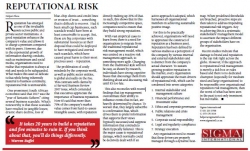Helper Zhou : Sigma International - Reputational Risk2018-04-25 Reputation has emerged as one of the invaluable assets across public and private sector institutions. A good reputation enhances the company’s value and allows it to charge a premium compared with its peers. However, due to the exponential growth of information sharing conduits, such as mainstream and social media, organisations need to realise that reputation is always at risk and needs to be safeguarded.
What makes this asset so delicate is that while being inherently material to business continuity, reputational risk is uninsurable. One prominent South African economist said that 2017 was the “year of fantastic failures†citing several business scandals. What’s noteworthy is that these scandals have resulted in tangible losses; drastic share decline, loss of blue-chip clients and credit lines or erosion of trust â€" something that is difficult to recover. Had it been small cap businesses, such scandals would have been at least conceivable to accept. But, these are big corporates with substantial resources at their disposal that could be deployed to have mitigated and averted such scandals, which have caused great harm to their most precious asset â€" reputation. The proliferation of costly misdeeds by the corporate world, as well as public sector entities, is global and sadly on the rise. This contrasts with claims by a Harvard Business Review 2007 issue, which contended that executives appreciate the importance of business reputation. Now it’s said that more than 70% of the company’s market value comes from hard-to-assess intangible assets, with reputation directly making up 25% of that. As such, this shows that in this increasingly competitive space, companies need to ensure that they build strong reputations. With vast empirical cases to learn from; there is a need for organisations to migrate from the traditional reputational risk management model, which was centred on a reactive risk management approach, to something more agile. Changing from the traditional style will not be easy, as shown by research, individuals have strong cognitive biases that discourage them from thinking about and discussing risk until it’s too late. This also reconciles with recent findings that top management overestimate their ability to influence events that in fact, are heavily determined by chance. To worsen that, they largely subscribe to confirmation bias, which drives them to prefer information that supports their views (typically successes) and suppress information that contradicts them (typically failures). This is the major cause to reputational damage, which normally could be decisively dealt with if an active approach is adopted, which harnesses all organisational members in achieving sustainable positive image. For this to be practically achieved, organisations will need to appreciate the construct of reputation as a business asset. Reputation has been defined by various studies as a perception of the company by various internal and external stakeholders and is distinct from the company’s actual character. To sustain growing positive reputation in the market, every organisation should appreciate the main drivers of reputational risk, which can be condensed into seven categories:
Recent studies indicate that damage to brand and reputation is the top risk right across the globe. However, if the approach to reputational risk management is merely a tick box or rules based and there is no dedicated champion (especially for medium sized and large organisations) to be responsible over organisational reputation risk management, then the worst of what has been seen in the past is not only imminent but inevitable. Sigma International T: 031 201 0788 C: 073 176 5014 helper@sigmaintl.co.za www.sigmaintl.co.za |
Helper Zhou : Sigma International - Reputational Risk
Copyright © 2024 KwaZulu-Natal Top Business
